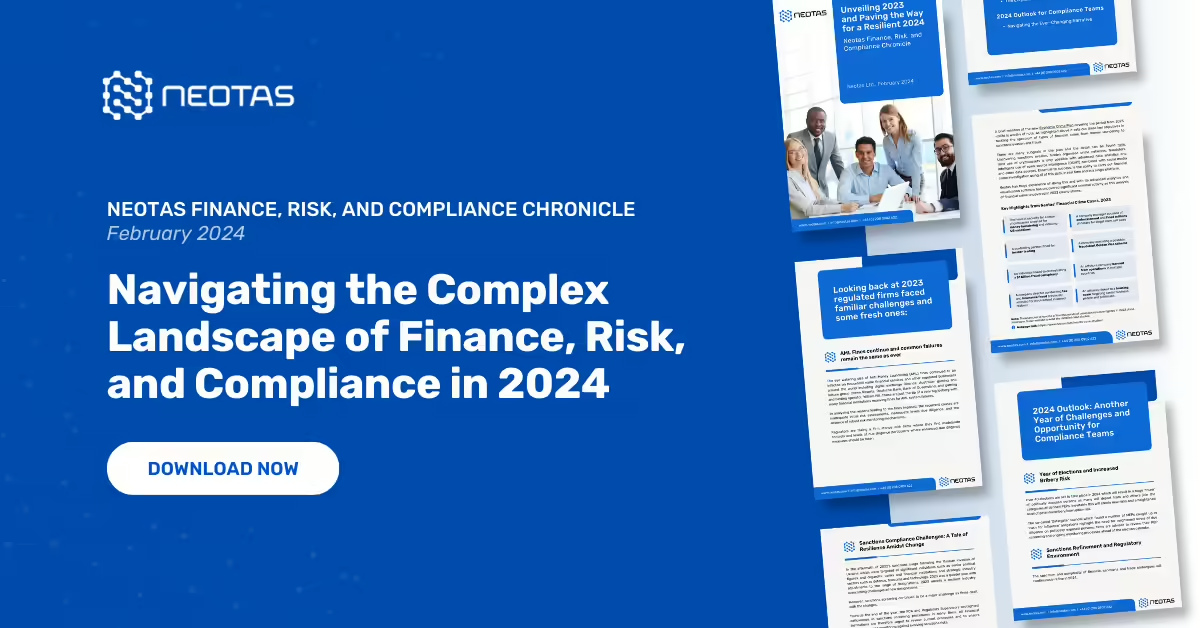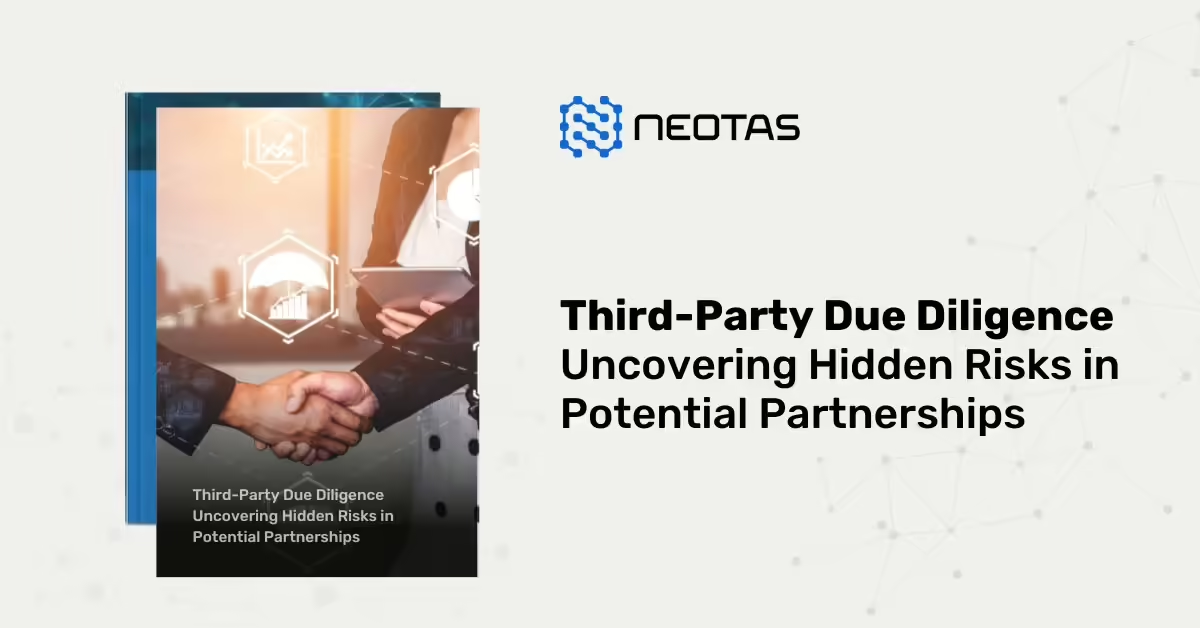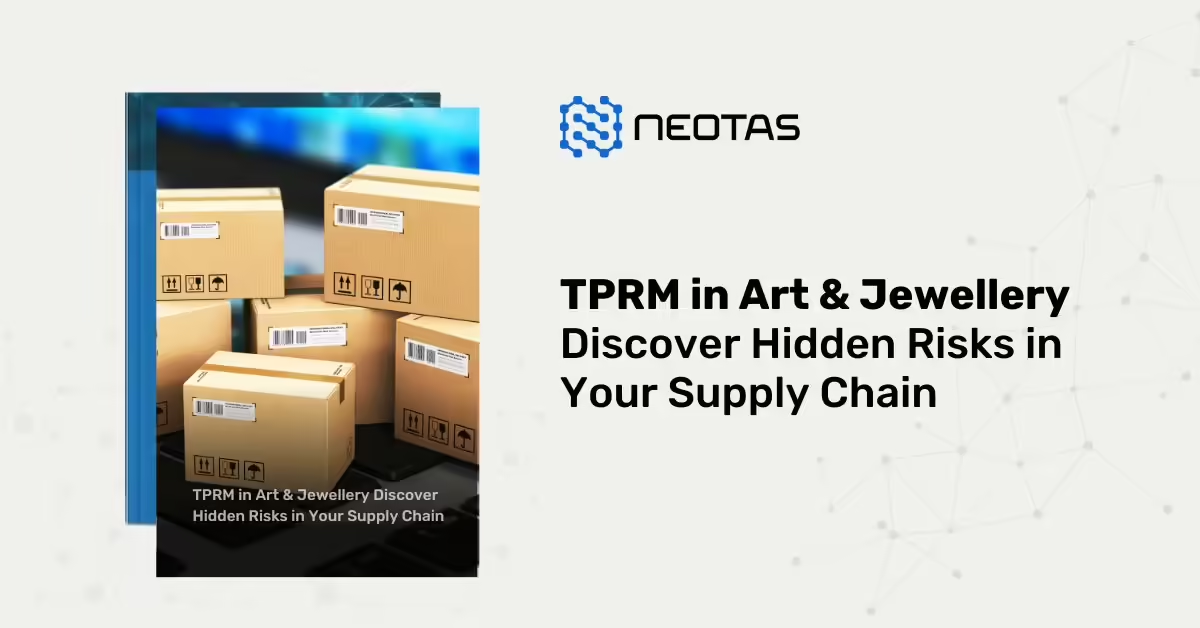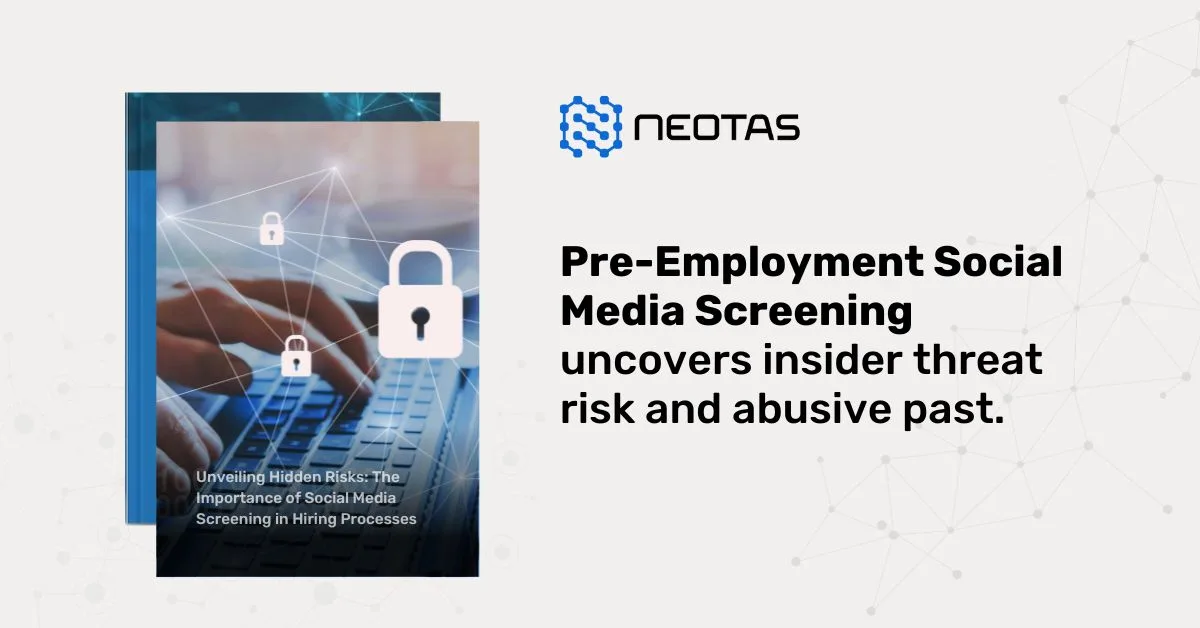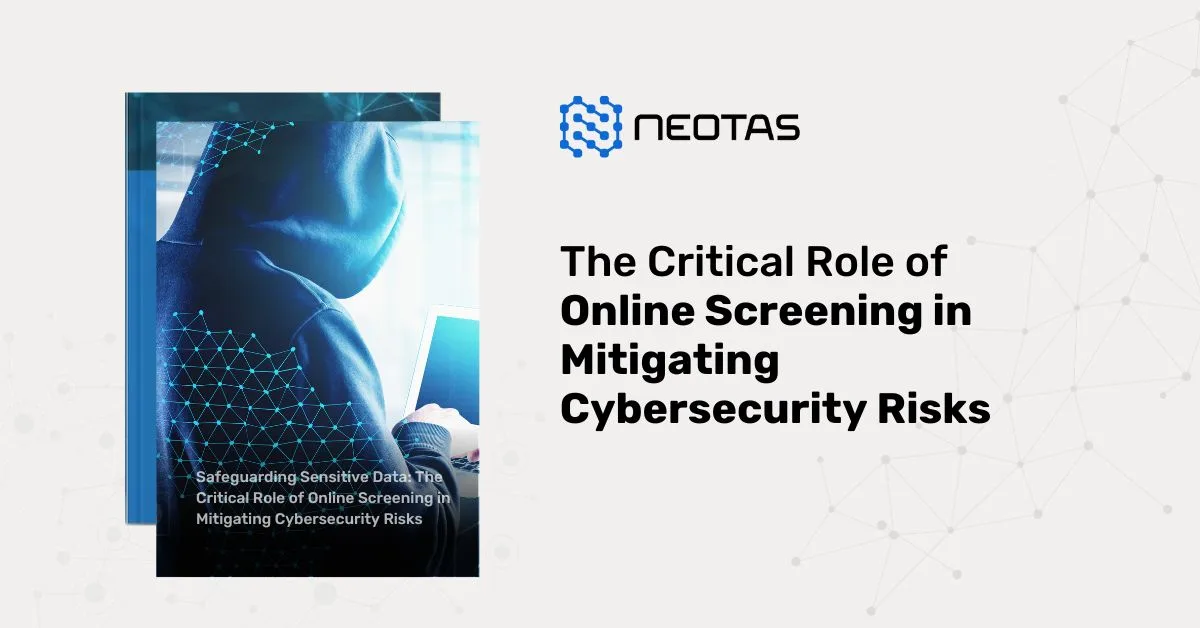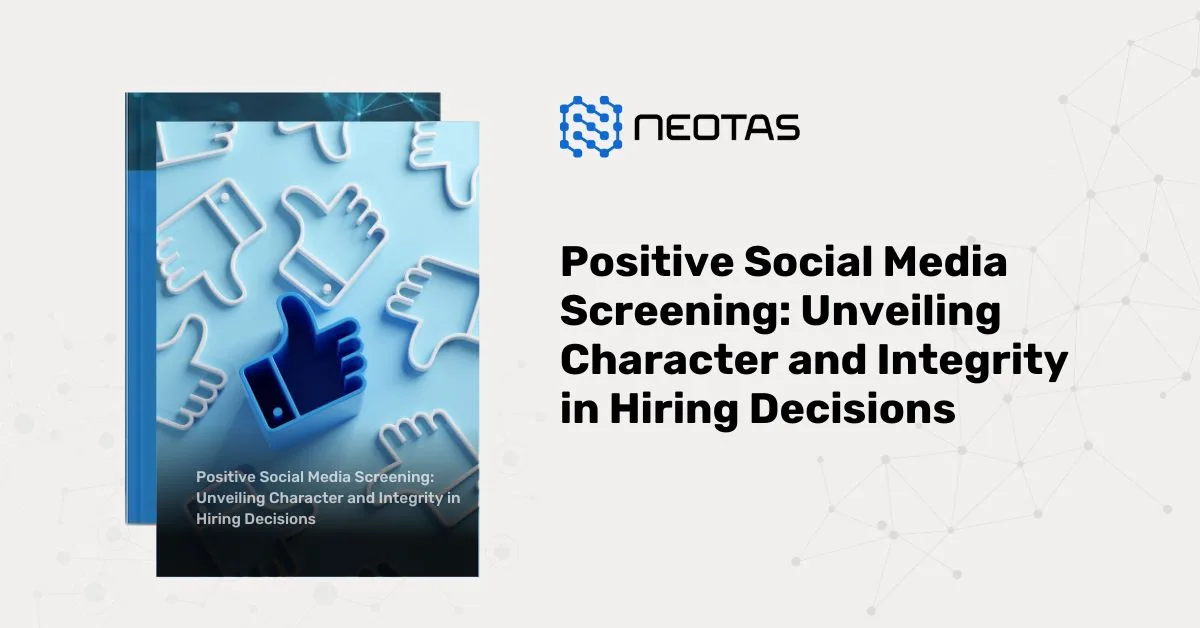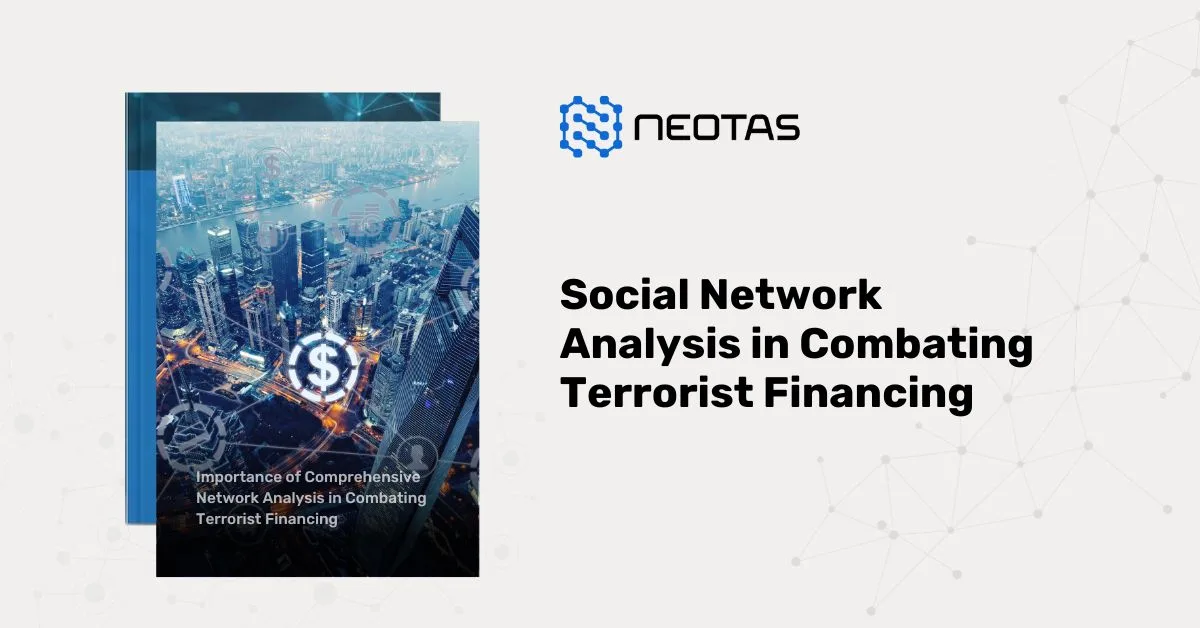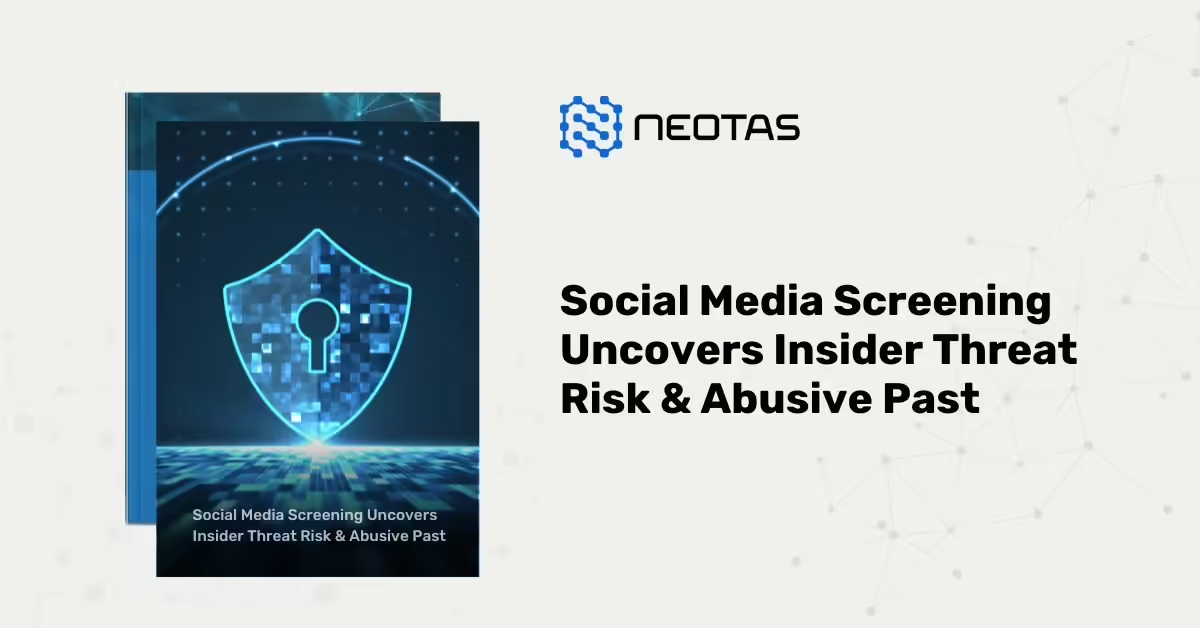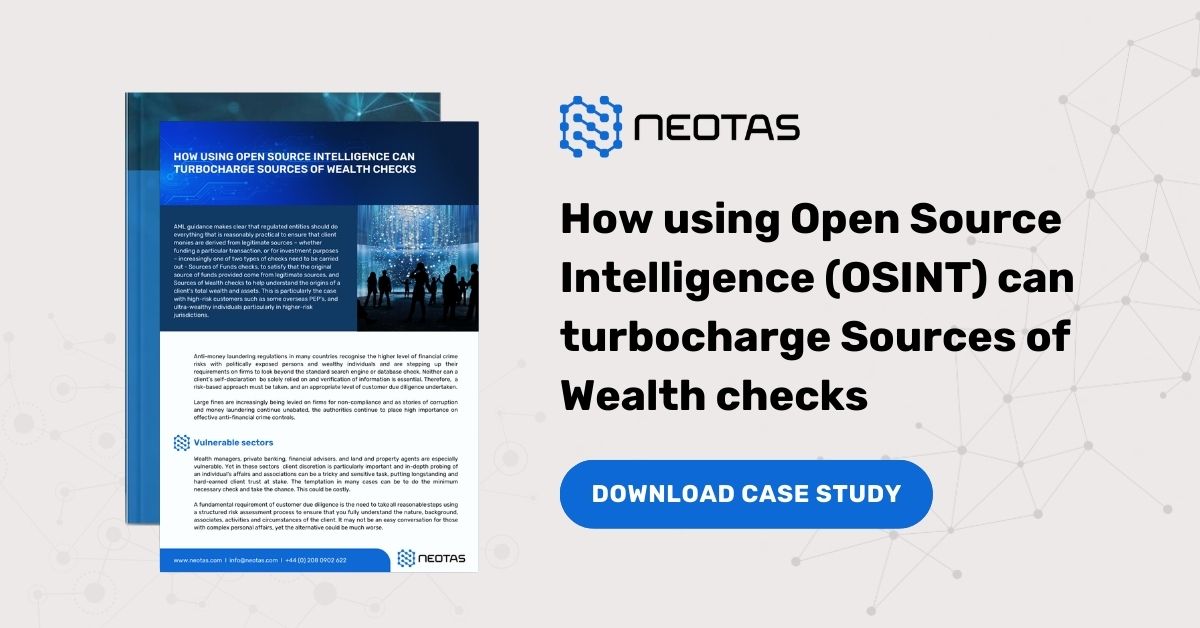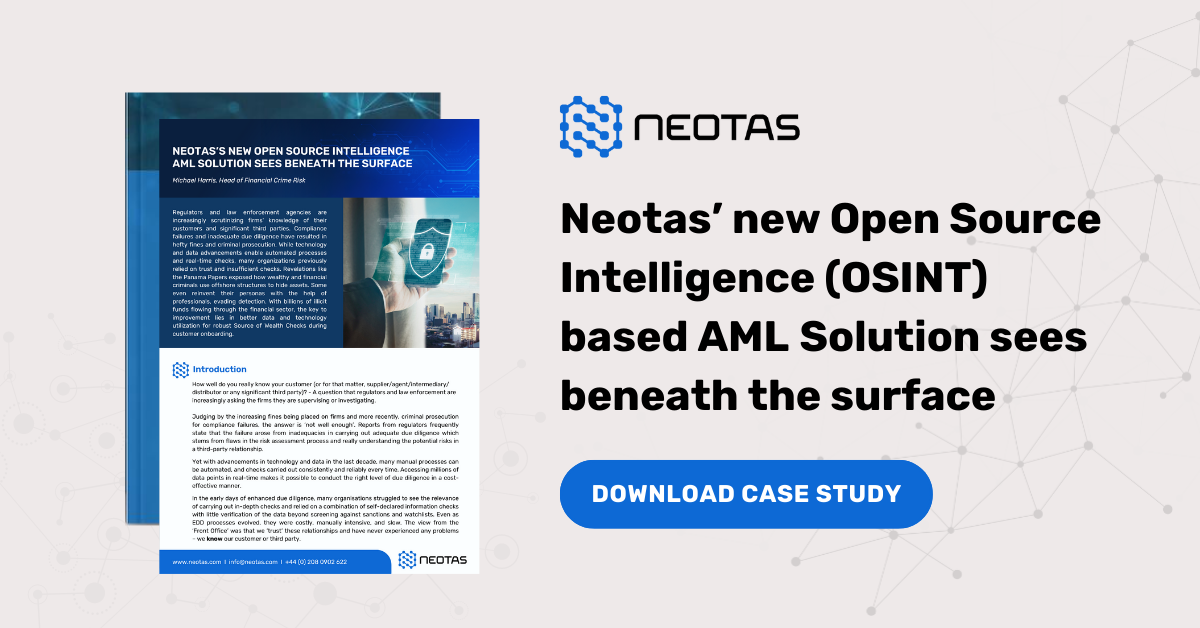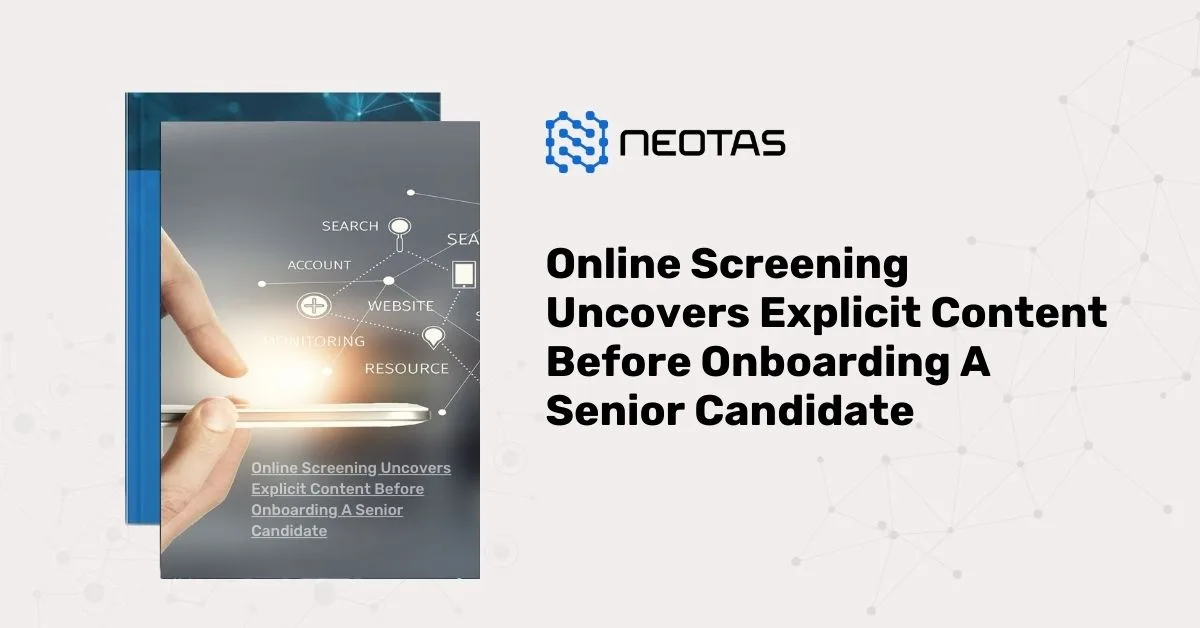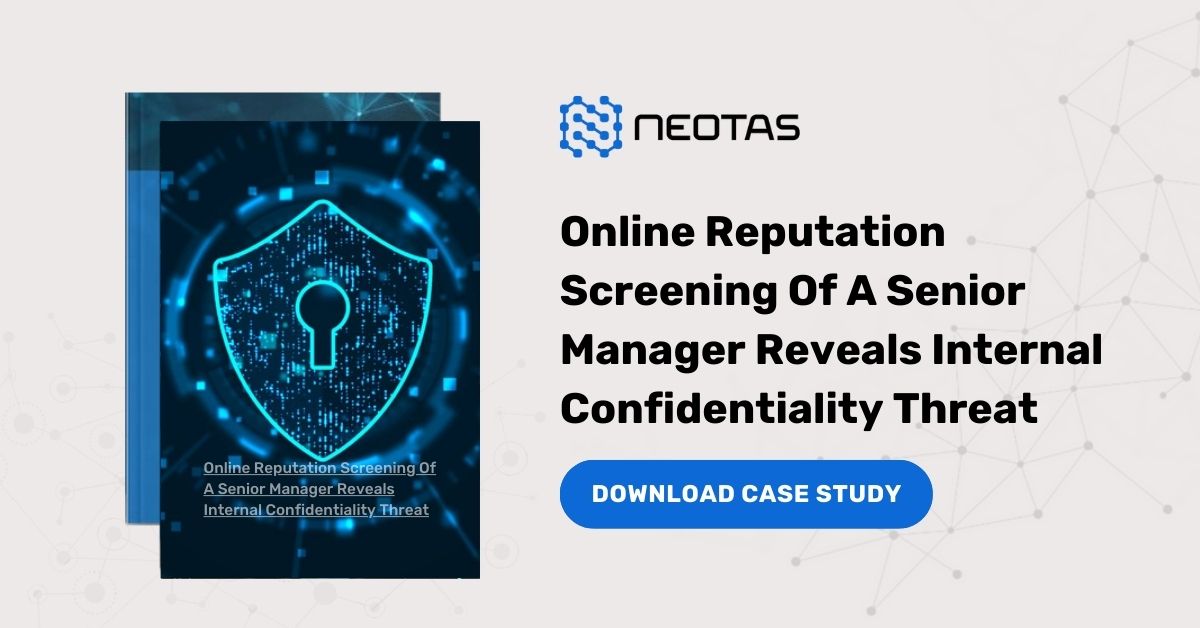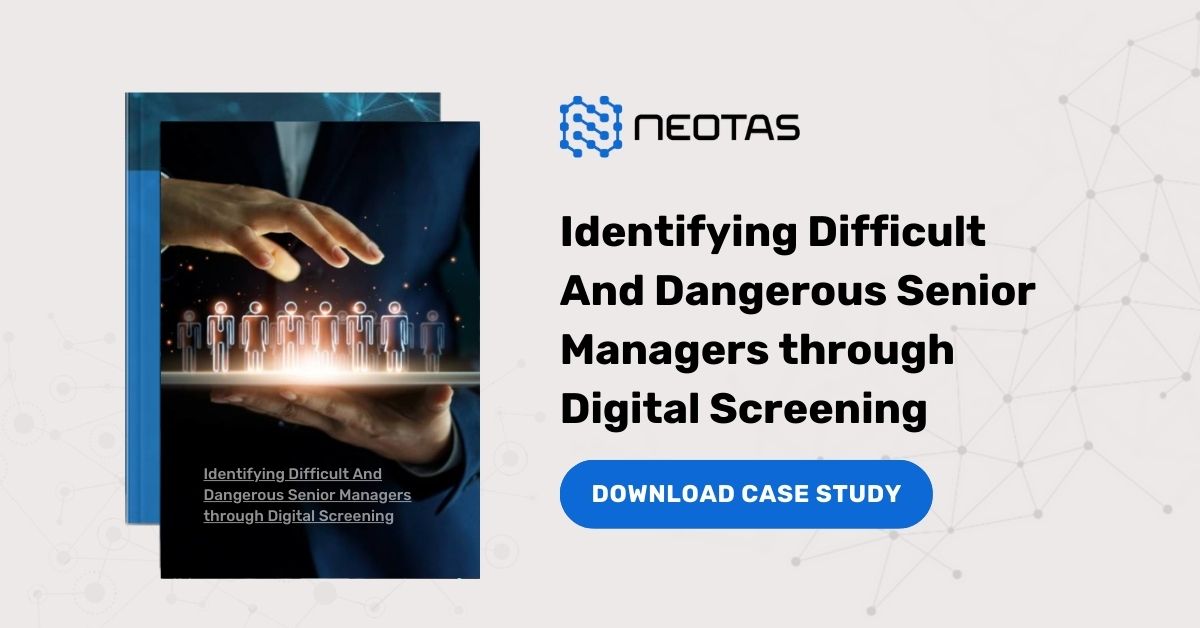Vendor Due Diligence best practices
How to Conduct Due Diligence on New Vendors?
In today’s interconnected business landscape, organisations increasingly rely on third-party vendors and service providers to enhance their operations, access specialised expertise, and drive cost efficiencies. However, this reliance on external entities also introduces potential risks that, if left unmitigated, can have severe consequences for an organisation’s reputation, financial stability, and overall success. Conducting thorough due diligence on new vendors is a critical process that helps organisations effectively manage these risks and foster successful vendor relationships.
Implementing Best Practices in Vendor Due Diligence
Adhering to industry best practices in vendor due diligence is essential for organisations to make informed decisions and mitigate potential risks associated with new vendor engagements.
These best practices encompass a range of critical areas, including:
Establish a Comprehensive Due Diligence Framework
Organisations should develop a comprehensive due diligence framework that outlines the processes, roles, and responsibilities involved in evaluating new vendors. This framework should be tailored to the organisation’s specific needs, industry requirements, and risk appetite.
Conduct a Thorough Risk Assessment
Before initiating the due diligence process, organisations should conduct a thorough risk assessment to determine the level of risk associated with the vendor’s services or products. This assessment should consider factors such as the criticality of the vendor’s services, the sensitivity of the data or information involved, and the potential impact of a vendor failure or breach on the organisation’s operations.
Gather Comprehensive Information
Gathering comprehensive information about the vendor is a crucial step in the due diligence process. This may include obtaining and reviewing the vendor’s financial statements, legal documents, contracts, policies, and procedures. Additionally, organisations should conduct background checks on the vendor’s key personnel, management team, and ownership structure.
Evaluate Operational Capabilities and Service Delivery
Organisations should thoroughly evaluate the vendor’s operational capabilities and service delivery processes to ensure they can meet the required standards and deliver the expected services or products consistently and reliably. This may involve conducting on-site visits, reviewing the vendor’s infrastructure, and assessing their capacity and scalability.
Assess Cybersecurity and Data Protection Measures
In today’s digital age, cybersecurity and data protection are paramount concerns. The due diligence process should include a comprehensive assessment of the vendor’s cybersecurity measures, data handling practices, and compliance with relevant regulations and industry standards, such as the General Data Protection Regulation (GDPR) or the Payment Card Industry Data Security Standard (PCI DSS).
Evaluate Business Continuity and Disaster Recovery Plans
Ensuring the continuity of operations is crucial for both the organisation and the vendor. The due diligence process should evaluate the vendor’s business continuity and disaster recovery plans, assessing their ability to maintain service delivery and recover from potential disruptions or incidents.
Review Compliance and Regulatory Requirements
Depending on the industry and the nature of the vendor’s services, there may be specific compliance and regulatory requirements that must be evaluated. This could include assessing the vendor’s adherence to relevant laws, regulations, and industry standards, as well as their ability to meet any specific contractual obligations or service level agreements (SLAs).
Negotiate Robust Contracts and Service Level Agreements
Once the due diligence process is complete, organisations should negotiate robust contracts and service level agreements (SLAs) that clearly define the roles, responsibilities, and expectations of both parties. These contracts should include provisions for performance monitoring, data protection, termination clauses, and indemnification.
Establish Ongoing Monitoring and Performance Evaluation
Vendor due diligence is not a one-time event; it is an ongoing process that requires continuous monitoring and performance evaluation. Organisations should establish mechanisms for regular reviews, audits, and performance assessments to ensure that the vendor continues to meet the required standards and mitigate any emerging risks.
Foster Collaboration and Information Sharing
Fostering collaboration and information sharing among industry peers and relevant stakeholders can enhance vendor due diligence practices. Participating in industry forums, sharing best practices, and leveraging collective intelligence can provide valuable insights and help organisations stay ahead of emerging risks and trends.
Benefits of Adhering to Vendor Due Diligence Best Practices
Implementing industry best practices in vendor due diligence offers numerous benefits to organisations, including:
Enhanced Risk Mitigation:
By thoroughly evaluating potential vendors and their associated risks, organisations can implement effective mitigation strategies, reducing the likelihood of adverse events or disruptions.
Operational Resilience:
Ensuring that vendors meet the required standards and have robust business continuity plans helps organisations maintain operational resilience and minimise the impact of potential disruptions or vendor failures.
Regulatory Compliance:
Many industries and jurisdictions have specific regulations governing third-party risk management and data protection. Adhering to best practices in vendor due diligence helps organisations demonstrate compliance and avoid costly penalties or reputational damage.
Cost Optimization and Value Maximization:
By thoroughly evaluating vendors and their capabilities, organisations can select those that offer the best value for money, optimising costs while ensuring high-quality services or products that align with their business objectives.
Competitive Advantage and Stakeholder Confidence:
Implementing robust vendor due diligence practices can differentiate an organisation from its competitors, demonstrating a commitment to risk management and instilling confidence in customers, partners, and stakeholders.
In the contemporary business environment, where third-party vendor relationships are increasingly prevalent, conducting thorough due diligence on new vendors is a critical process for effective third-party risk management. By adhering to industry best practices, such as establishing comprehensive due diligence frameworks, conducting thorough risk assessments, evaluating operational capabilities and cybersecurity measures, negotiating robust contracts, and establishing ongoing monitoring, organisations can mitigate risks, maintain operational resilience, and foster successful vendor partnerships. Ultimately, embracing these best practices not only protects an organisation’s interests but also fosters trust, facilitates regulatory compliance, and ensures long-term success in an increasingly interconnected and complex business landscape.
Read the detailed guide on Vendor Due Diligence Checklist
Download the TPRM Questionnaire Template
How can Neotas Vendor Due Diligence process help?
Enhance your vendor due diligence process with Neotas. Our rigorous analysis minimises risks, expedites sales, and increases value creation. Gain buyer confidence through objective assessments. Through our enhanced due diligence platform, businesses can efficiently track and evaluate vendors and contractors, ensuring adherence to security protocols in a cost-effective manner.
The Neotas platform automates the vendor onboarding process, streamlining the addition of new vendors with remarkable ease and speed.
Moreover, Neotas provides a customisable dashboard, enabling businesses to proactively identify and address emerging risks. By consolidating vital vendor information, Neotas facilitates the seamless integration of risk management into existing Customer Relationship Management (CRM) and Supply Chain Management (SCM) systems, ultimately helping businesses maximise profits while minimising risk exposure.
Request a Demo
If you’re curious about whether our Vendor Due Diligence solutions and services align with your organisation, don’t hesitate to schedule a call. We’re here to help you make informed decisions tailored to your needs.
Vendor Due Diligence Solutions:
- Enhanced Due Diligence
- Management Due Diligence
- Customer Due Diligence
- Simplified Due Diligence
- Third Party Risk Management
- Vendor Due Diligence
- Vendor Due Diligence (VDD) Guide
- Vendor Due Diligence Report
- Vendor Due Diligence Checklist
- Vendor Due Diligence Questionnaire
- Vendor Due Diligence Process
- Open Source Intelligence (OSINT)
- Introducing the Neotas Enhanced Due Diligence Platform
Vendor Due Diligence Case Studies:
- Third Party Risk Management (TPRM) Using OSINT
- Open-source Intelligence For Supply Chain – OSINT
- ESG Risk Management Framework with Neotas’ OSINT Integration
- Open Source Intelligence In AML Compliance | Case Study
- Identifying Difficult And Dangerous Senior Managers
- ESG Risk Investigation Uncovers Supply Chain Risks
- Financial Crime Compliance & Risk Management Trends
- Network Analysis Reveals International Links In Credit Risk Case
- Network Analysis and Due Diligence – Terrorist Financing
- Using OSINT For Sources Of Wealth Checks
- ESG Risks Uncovered In Investigation For Global Private …
- PEP Screening: Undisclosed Political Links Uncovered For European Organisation
- Risk-Based Approach (RBA) to AML & KYC risk management
- Anti-Money Laundering (AML)
- Supply Chain Risk Management
- Due Diligence Explained: Types, Checklist, Process, Reports
FAQs on Vendor Due Diligence Best Practices
How to do due diligence on a vendor?
To conduct due diligence on a vendor, organizations should follow a comprehensive process that includes gathering and analyzing relevant information, assessing potential risks, and evaluating the vendor’s capabilities. Key steps involve conducting background checks, reviewing financial statements, assessing operational processes, evaluating cybersecurity measures, examining compliance with regulations, negotiating robust contracts, and establishing ongoing monitoring mechanisms.
What is the difference between due diligence and vendor due diligence?
Due diligence is a broad term that refers to the process of gathering and analyzing information about a company, asset, or transaction to assess potential risks and opportunities. Vendor due diligence, on the other hand, is a specific type of due diligence focused on evaluating the risks and capabilities of a third-party vendor or service provider that an organization is considering engaging.
What is the due diligence process for suppliers?
The due diligence process for suppliers, also known as vendor due diligence, involves assessing the supplier’s financial stability, operational capabilities, quality control processes, compliance with regulations, and overall risk profile. It typically includes reviewing financial statements, conducting site visits, evaluating supply chain management, assessing cybersecurity measures, and negotiating robust contracts with appropriate Service Level Agreements (SLAs).
What is vendor due diligence in M&A?
In the context of Mergers and Acquisitions (M&A), vendor due diligence refers to the process of evaluating the risks and opportunities associated with the target company’s third-party vendor relationships. This includes assessing the criticality of vendor services, contractual terms, data privacy and security measures, as well as the potential financial and operational impacts of vendor relationships on the combined entity.
What is the scope of vendor due diligence?
The scope of vendor due diligence typically encompasses various aspects, including legal and corporate evaluation, financial assessment, operational and service capability assessment, information security and data protection, business continuity and disaster recovery, reputational risk assessment, third-party risk management, contract review and negotiation, and ongoing monitoring and performance evaluation.
What are the objectives of vendor due diligence?
The primary objectives of vendor due diligence are to identify and mitigate potential risks associated with engaging a third-party vendor, ensure compliance with relevant regulations and industry standards, evaluate the vendor’s capabilities to deliver expected services or products consistently and reliably, and ultimately foster a successful and mutually beneficial vendor relationship.
What are the 4 P’s of due diligence?
The 4 P’s of due diligence refer to a framework used to evaluate potential risks and opportunities associated with a transaction or business relationship. The 4 P’s are: People (assessing the management team and key personnel), Product (evaluating the products or services offered), Process (examining operational processes and systems), and Premises (analyzing physical assets and facilities).
What is a due diligence checklist?
A due diligence checklist is a comprehensive list of items or areas that need to be reviewed and evaluated during the due diligence process. It serves as a guide to ensure that all relevant aspects are covered, including legal and regulatory compliance, financial analysis, operational assessments, cybersecurity measures, and contractual terms, among others. The checklist helps standardize and streamline the due diligence process.
What is RFP due diligence?
RFP (Request for Proposal) due diligence refers to the process of evaluating and assessing potential vendors or service providers who have submitted proposals in response to an organization’s RFP. It involves analyzing the vendor’s capabilities, qualifications, pricing, and overall suitability to meet the organization’s requirements outlined in the RFP.
What is the opposite of vendor due diligence?
The opposite of vendor due diligence is vendor assessment or vendor evaluation, which is the process of evaluating and selecting vendors or suppliers based on predefined criteria, such as pricing, quality, delivery times, and customer service, without necessarily conducting a comprehensive risk assessment or in-depth due diligence.
What are the risks of not performing vendor due diligence?
Failing to perform vendor due diligence can expose an organization to significant risks, including financial losses, operational disruptions, reputational damage, legal liabilities, data breaches, regulatory non-compliance, and potential business failures. It can also lead to selecting unsuitable vendors, entering into unfavorable contracts, and overlooking critical risks that could have been mitigated with proper due diligence.
What are the key roles in due diligence?
The key roles in the due diligence process typically include a due diligence team lead or coordinator, subject matter experts (e.g., legal, financial, technical, and industry experts), project managers, risk management professionals, and representatives from relevant business units or departments. Additionally, external advisors or consultants may be engaged to provide specialized expertise or independent assessments.

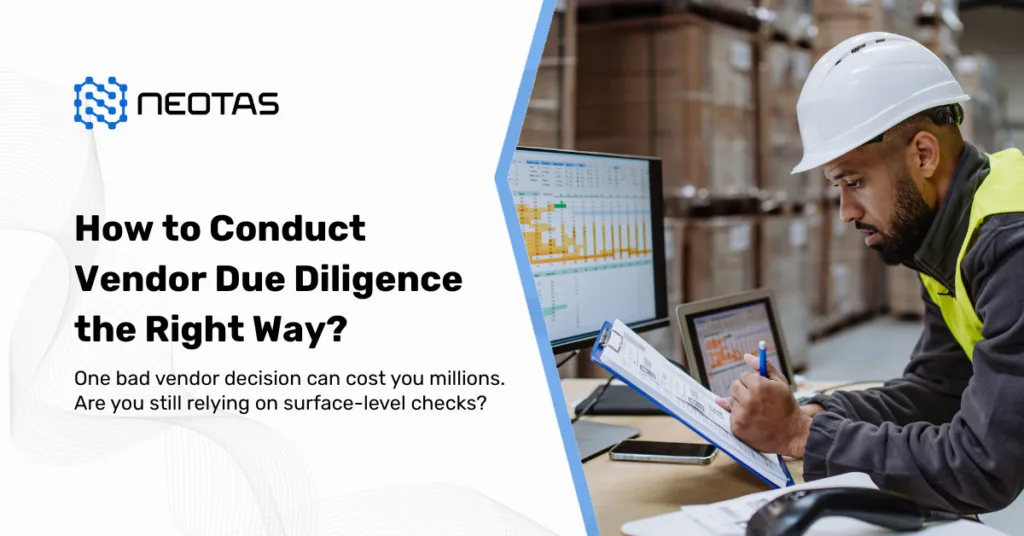

 Financial Crime Compliance Trends 2024
Financial Crime Compliance Trends 2024